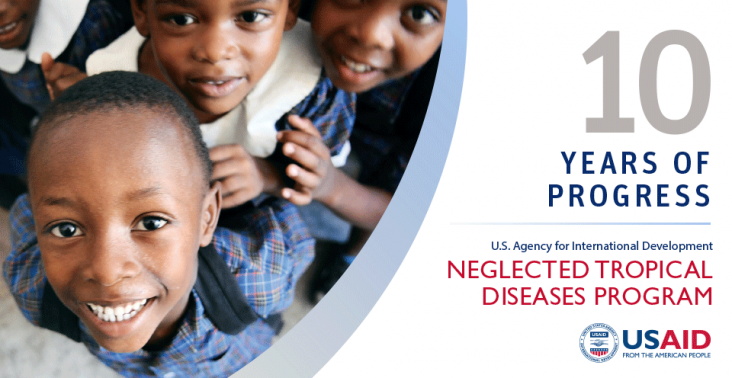- What We Do
- Agriculture and Food Security
- Democracy, Human Rights and Governance
- Economic Growth and Trade
- Education
- Ending Extreme Poverty
- Environment and Global Climate Change
- Gender Equality and Women's Empowerment
- Global Health
- Water and Sanitation
- Working in Crises and Conflict
- U.S. Global Development Lab
Neglected tropical diseases (NTDs) refers to a diverse group of parasitic and bacterial diseases that cause significant morbidity and mortality in more than 1 billion people worldwide, which disproportionately affect poor and marginalized populations. These diseases can cause severe disfigurement and disabilities, including blindness, developmental disabilities and malnutrition. These conditions, in turn, can cause both social and economic challenges in the regions where they are most common.
NTDs coexist with poverty because they thrive where access to clean water and sanitation are limited, and people live without protection from disease vectors. NTDs contribute to poverty as well, since they can:
- Impair intellectual development in children.
- Reduce school enrollment.
- Hinder economic productivity by limiting the ability of infected individuals to work.
Fortunately, seven of the most prevalent NTDs can be controlled through preventive chemotherapy that has been proven to be safe and effective and that can be delivered in an integrated manner through mass drug administration.
These diseases include schistosomiasis, onchocerciasis, lymphatic filariasis, trachoma, and three soil-transmitted helminths, commonly known as hookworm, roundworm and whipworm.
U.S. Agency for International Development (USAID) support for NTDs focuses on the scale-up of efficient and sustained preventive chemotherapy in an integrated manner so that World Health Organization 2020 goals of control and elimination of these diseases can be achieved.
USAID has become a global leader in large-scale implementation of integrated treatment programs for NTDs. Over the past 10 years, the U.S. Government has leveraged $11.1 billion in donated medicines, resulting in the delivery of more than 1.6 billion treatments to approximately 743 million people through our integrated programs.
In addition to mass drug administration, the USAID NTD Program supports complementary investments in operational research, research and development, and morbidity management.
News
STAY CONNECTED
Subscribe to the Global Health E-Newsletter and updates by entering your e-mail address below. Take a look at some of our past issues.
Follow USAID Global Health on Social Media:








Comment
Make a general inquiry or suggest an improvement.